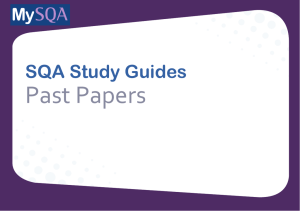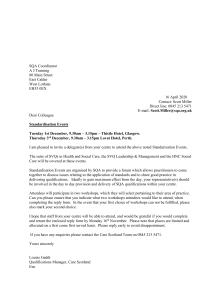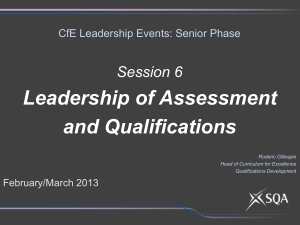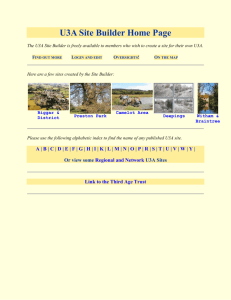LEARNED SOCIETIES` GROUP
advertisement
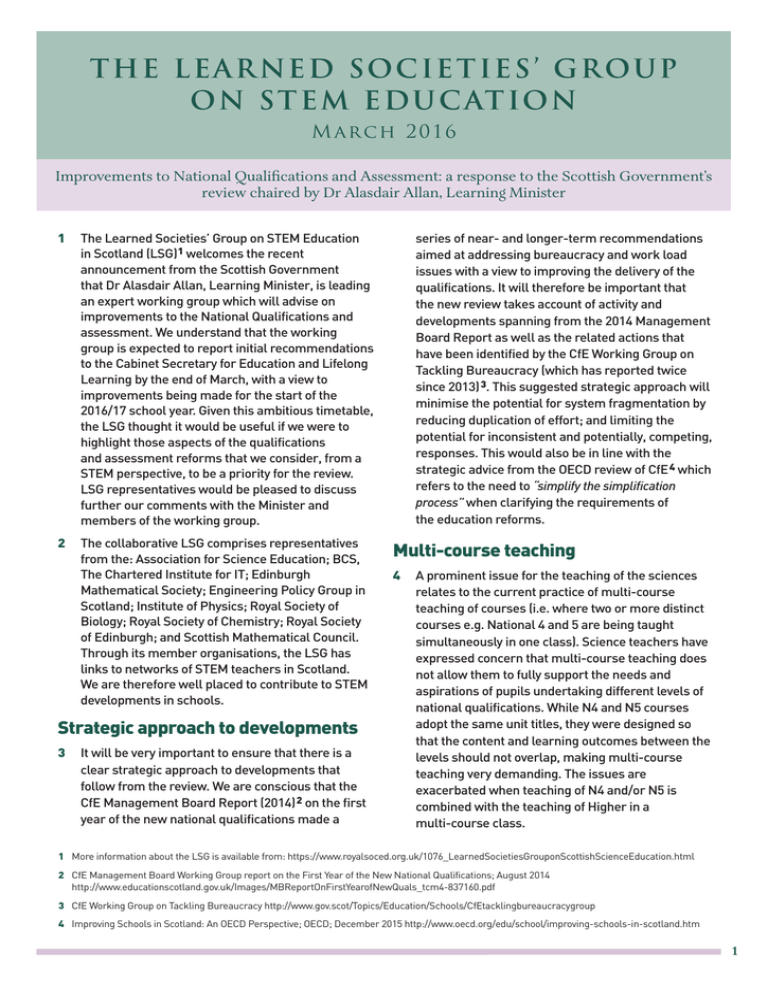
THE LEARNED SOCIETIES’ GROUP ON S T E M E D U C AT ION March 2016 Improvements to National Qualifications and Assessment: a response to the Scottish Government’s review chaired by Dr Alasdair Allan, Learning Minister 1 The Learned Societies’ Group on STEM Education in Scotland (LSG)1 welcomes the recent announcement from the Scottish Government that Dr Alasdair Allan, Learning Minister, is leading an expert working group which will advise on improvements to the National Qualifications and assessment. We understand that the working group is expected to report initial recommendations to the Cabinet Secretary for Education and Lifelong Learning by the end of March, with a view to improvements being made for the start of the 2016/17 school year. Given this ambitious timetable, the LSG thought it would be useful if we were to highlight those aspects of the qualifications and assessment reforms that we consider, from a STEM perspective, to be a priority for the review. LSG representatives would be pleased to discuss further our comments with the Minister and members of the working group. 2 The collaborative LSG comprises representatives from the: Association for Science Education; BCS, The Chartered Institute for IT; Edinburgh Mathematical Society; Engineering Policy Group in Scotland; Institute of Physics; Royal Society of Biology; Royal Society of Chemistry; Royal Society of Edinburgh; and Scottish Mathematical Council. Through its member organisations, the LSG has links to networks of STEM teachers in Scotland. We are therefore well placed to contribute to STEM developments in schools. Strategic approach to developments 3 It will be very important to ensure that there is a clear strategic approach to developments that follow from the review. We are conscious that the CfE Management Board Report (2014) 2 on the first year of the new national qualifications made a series of near- and longer-term recommendations aimed at addressing bureaucracy and work load issues with a view to improving the delivery of the qualifications. It will therefore be important that the new review takes account of activity and developments spanning from the 2014 Management Board Report as well as the related actions that have been identified by the CfE Working Group on Tackling Bureaucracy (which has reported twice since 2013) 3. This suggested strategic approach will minimise the potential for system fragmentation by reducing duplication of effort; and limiting the potential for inconsistent and potentially, competing, responses. This would also be in line with the strategic advice from the OECD review of CfE 4 which refers to the need to “simplify the simplification process” when clarifying the requirements of the education reforms. Multi-course teaching 4 A prominent issue for the teaching of the sciences relates to the current practice of multi-course teaching of courses (i.e. where two or more distinct courses e.g. National 4 and 5 are being taught simultaneously in one class). Science teachers have expressed concern that multi-course teaching does not allow them to fully support the needs and aspirations of pupils undertaking different levels of national qualifications. While N4 and N5 courses adopt the same unit titles, they were designed so that the content and learning outcomes between the levels should not overlap, making multi-course teaching very demanding. The issues are exacerbated when teaching of N4 and/or N5 is combined with the teaching of Higher in a multi-course class. 1 More information about the LSG is available from: https://www.royalsoced.org.uk/1076_LearnedSocietiesGrouponScottishScienceEducation.html 2 CfE Management Board Working Group report on the First Year of the New National Qualifications; August 2014 http://www.educationscotland.gov.uk/Images/MBReportOnFirstYearofNewQuals_tcm4-837160.pdf 3 CfE Working Group on Tackling Bureaucracy http://www.gov.scot/Topics/Education/Schools/CfEtacklingbureaucracygroup 4 Improving Schools in Scotland: An OECD Perspective; OECD; December 2015 http://www.oecd.org/edu/school/improving-schools-in-scotland.htm 1 T H E L E A R N E D S O C I E T I E S ’ G R O U P O N S T E M E D U C AT I O N A recent survey 5 of its members by the Scottish Secondary Teachers’ Association highlights the potential scale of multi-course teaching: 47% of teachers reported that they were teaching two courses, while 23% said that they were teaching three courses within the same class. In 2014, the LSG surveyed 6 science teachers on their experiences of implementing CfE and the national qualifications. This included gathering their views on how confident they were in teaching the new courses. While the majority of science teachers indicated that they were confident about teaching the N5 courses to a single class of N5 candidates, this changed markedly where teachers were required to teach multi-course classes. To investigate the issue of multi-course teaching further, between December 2015 and January 2016 the Royal Society of Chemistry's Education Division Regional Committee for Scotland undertook a survey into Chemistry teaching in the Senior Phase capturing responses from 259 teachers. This survey revealed how common multi-course classes have become with 73% of National 5 classes containing students studying towards different national qualification courses. The most common combination found containing National 5 students was combined National 4 & National 5 classes. When asked how well students can be supported within such composite N4/5 classes, 69% said “not at all” or “not very well”. For Higher students around a fifth of classes contain multi-course groupings. Alarmingly, when asked how well students’ learning could be supported in the most common combination, National 5/Higher classes, 99.5% responded “not at all” or “no very well”. In this context, the LSG views it as a very positive development that the Scottish Government has convened a meeting in early March, bringing together those with detailed knowledge of the science courses, including representatives of the learned scientific societies, to discuss ways in which the challenges related to multi-course teaching can be addressed. We look forward to hearing about and, engaging with, the progress made at the meeting. Internal assessment 5 The CfE Management Board Report (2014) stated that, “it is clear that…there has been a significant and unsustainable level of over-assessment in many parts of the system. This increase in assessment was not intended, and requires to be addressed at both national and local level.” In seeking to reduce the assessment burden in STEM subjects, we recognise that SQA has removed and consolidated some of the assessment standards and improved the communication of changes made to course documentation. SQA has also implemented a programme of activity to support teachers’ understanding of the national standards required for assessment; and, in turn, build their confidence in preparing and assessing learners. While welcoming these responses, the LSG has expressed concern about the reactive nature of the developments. 6 STEM teachers continue to express concern about the burden and time demands associated with internal assessment and the implications this has for the time available for learning and teaching. The review should ensure that the assessment undertaken effectively supports learner progression. We would support the review giving priority to considering practical approaches to reducing the burden of internal assessment, both in terms of time and pressure on candidates and unnecessary administrative bureaucracy for teachers. To improve coherency of assessment, this could include exploring whether duplication in what is being assessed across different subject areas could be removed. We are also particularly keen to ensure that there remains sufficient opportunity for invaluable practical work. Additionally, while course assessments in the majority of subjects are marked externally, in the case of Computing Science coursework has to be marked by teachers internally. It is not clear to us why this should be the case and we are concerned that it is exacerbating the assessment burden. 5 SSTA survey of its members (1244 responses); December 2015 http://ssta.org.uk/2015/12/teacher-workload-control/ 6 The Reforms in Scottish Schools’ Science Education: Survey results; Learned Societies’ Group; January 2015 https://www.royalsoced.org.uk/cms/files/education/Learned%20Societies%20Science%20Education/Curriculum_Structures_Assessment_Survey_Report.pdf 2 T H E L E A R N E D S O C I E T I E S ’ G R O U P O N S T E M E D U C AT I O N Uptake of STEM courses 7 8 The LSG continues to monitor the implications of the national qualifications on the uptake and attainment in the STEM subjects. The LSG recognises that the new qualifications will need to run for a number of cycles before trends can be drawn. We hope the review will consider the evolving pattern of course uptake, particularly the number of qualification courses that can be taken by learners in S4. While it is not the result of any conscious policy decision, the LSG is concerned about the potential for narrowing of the curriculum and the implications for study in the STEM subjects in the senior years at school. LSG analysis of the SQA Attainment Statistics 7 indicates that the number of candidates presenting for STEM qualifications at SCQF levels 4 and 5 have declined between 2013 (last year of Standard Grades) and 2015. Over this period Computing-related (which includes Information Systems) presentations were down by 29.3%; Chemistry is down by 11.3%; Biology is down by 7.9%; Physics is down by 4.8%; and Mathematics is down by 3.9%. We also note that between 2014 and 2015 the number of Higher entries decreased in the STEM subjects. Computing-related presentations were down by 15.4%; Chemistry is down by 4.6%; Physics is down by 4.2%; Biology is down by 4.1%; and Mathematics is down by 3.6%. This recent downturn in Higher STEM presentations is particularly concerning as they had generally been on the rise in the preceding period from 2011. The review might wish to consider the role of the Scottish Baccalaureate in Scottish education. Among its purposes is to raise the status and value of S6; to be a valued qualification for entry to higher education; and to be a bridge between school and what follows. Entries to the Science Baccalaureate (which, incidentally, has the highest uptake among the four Scottish Baccalaureates) have declined significantly: down from 151 entries in 2012 to 92 in 2015. The low and declining uptake indicates that the Baccalaureate does not carry sufficient currency among learners, teachers, parents, universities and employers to make it an attractive enough proposition. It is interesting to note, however, that the Baccalaureate is the only SQA qualification to formally recognise interdisciplinary learning (IDL), one of four explicit contexts for learning in CfE. Feedback on qualifications and assessment 9 There is a need to ensure that there are mechanisms for ensuring that teachers and learners are able to submit feedback to SQA on qualification courses and assessment. Practitioners and learners were able to submit formal feedback through the SQA’s annual National Course Assessment Survey, which was last undertaken in 2014. We understand that SQA took the decision to discontinue this survey as it wanted to develop a more representative and reliable system for gathering assessment-related feedback. It will be important to ensure that there is a visible mechanism that enables practitioners and learners to submit formal feedback. We are aware that SQA did undertake a survey exercise in December 2015 in relation to teachers’ feedback on unit assessment. However, this survey did not appear to be widely publicised. We suggest that surveys should be clearly sign-posted on the qualification and news pages of the SQA website. We would also expect SQA to report on how it has acted upon survey feedback. 10 In 2014, SQA established National Qualification Support Teams (NQSTs) covering the range of qualification courses. The NQSTs comprise a range of stakeholders, including teachers. Their remit is to provide advice to SQA for improving qualifications. While they meet only once annually, members are expected to actively participate via an online forum. This might be a timely opportunity to review the effectiveness of their operation, particularly the extent to which they are able to communicate issues and updates to/from the teaching profession. 7 SQA Attainment Statistics (August) 2015: http://www.sqa.org.uk/sqa/64717.html 3 T H E L E A R N E D S O C I E T I E S ’ G R O U P O N S T E M E D U C AT I O N Material resources, exemplars and support 11 We are very supportive of the online teacher networks for Biology, Chemistry, Computing and Physics among others, which enable teachers to share insights, experiences and innovative materials. However, this should not replace the requirement for well-planned, high quality, timely exemplars and resources to support qualification developments. We have been concerned that in order to meet their needs teachers have had to spend considerable time and effort adapting and editing the unit assessment support packs provided. We are also concerned that assessment instruments submitted to SQA for prior verification that vary even very slightly from the format of the exemplar unit assessment packs seem to be rejected, even when they have been written with the CfE principles in mind. We are aware that the SQA commissioned the Scottish Schools Education Research Centre (SSERC) to produce resource packs to support the Higher Assignment in Biology, Human Biology, Chemistry and Physics. We would support further activity of this kind. For further information about the Learned Societies’ Group, contact William Hardie, Secretariat (whardie@royalsoced.org.uk) The Learned Societies’ Group on STEM Education March 2016 The Association for Science Education Charity No: 313123 BCS is a registered charity No: 292786 The Edinburgh Mathematical Society (EMS) is a registered Scottish charity, No. SC000241 The Institute of Physics is Registered charity number 293851 (England & Wales) and SC040092 (Scotland) The Royal Society of Chemistry Registered Charity No: 207890 The Royal Society of Biology is Registered Charity No: 277981 The Royal Society of Edinburgh is Scottish Charity No: SC000470 The Institution of Engineering and Technology is Scottish Charity No: SC038698 4

